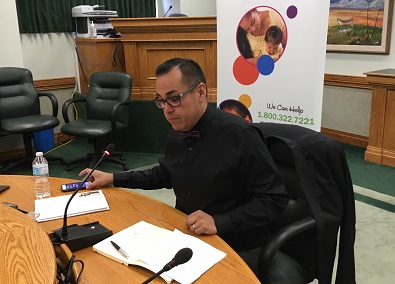Corey O’Soup. Photo courtesy of Manfred Joehnck.
Saskatchewan’s new Child and Youth Advocate has released his first report, saying his number one priority is to develop positive relationships with First Nations and Metis partners and reduce the number of Aboriginal children in care in the province.
Corey O’Soup also announced he wants to take the office in a new direction, one that is aimed at helping arrive at solutions rather than simply reporting problems.
“I think our office needs to be an office that is on the front lines that is on the ground working with our partners and our stakeholders,” he said.
“We need to ensure the work gets done, and not just be the voice that points out problems and says ‘here you go, now what are you going to do about it?’”
As part of the process, O’Soup has assigned two of his five advocates to deal specifically with Metis and First Nations children.
Last year, there were almost 5,000 children under government care in Saskatchewan, the vast majority of them were Aboriginal. At the same time, the number of foster homes was at a five-year low at 490.
O’Soup says this has resulted in many children staying in temporary accommodations like hotels or emergency shelters. He says there is still a lack of monitoring of foster homes and a lack of legislation in the province to enforce regulations.
The NDP is referencing the report to scold the Sask. Party’s record on children in care, with MLA Nicole Rancourt asking in Question Period if the government would commit to meaningful action.
Social Service Minister Tina Beaudry-Mellor said, increasingly, children are coming into care in the middle of the night due to criminal circumstances.
In response, she said her ministry has “increased the number of emergency placements in Regina over the past year. We have increased those spaces 118 per cent.”
She also said her ministry is “very, very aggressively targeting the increase in the number of foster families across the province.”
Another big issue for the advocate is the teen suicide crisis, particularly in the north. O’Soup is working on a special report that will be released late this year. He says that report will be solely the voice of the youth and what they see as the issues and the solutions. Last fall, six young Aboriginal girls committed suicide in the span of four weeks.
The NDP lambasted the Sask. Party in the legislative chambers on that topic, with MLA Buckley Belanger asking why the province is “walking away from this crisis?”
Remote Health Minister Greg Ottenbreit said he is committed to speaking directly with northern leaders on ways to address youth suicides.
O’Soup says one possible solution is to place mental health care professionals in schools where mental wellness could be dealt with on a long-term basis.
Twenty-one children died while under the care of the province and there were 38 critical injuries. Most of the deaths involved children under the age of six. The number of deaths and injuries is on par with the five-year average.
